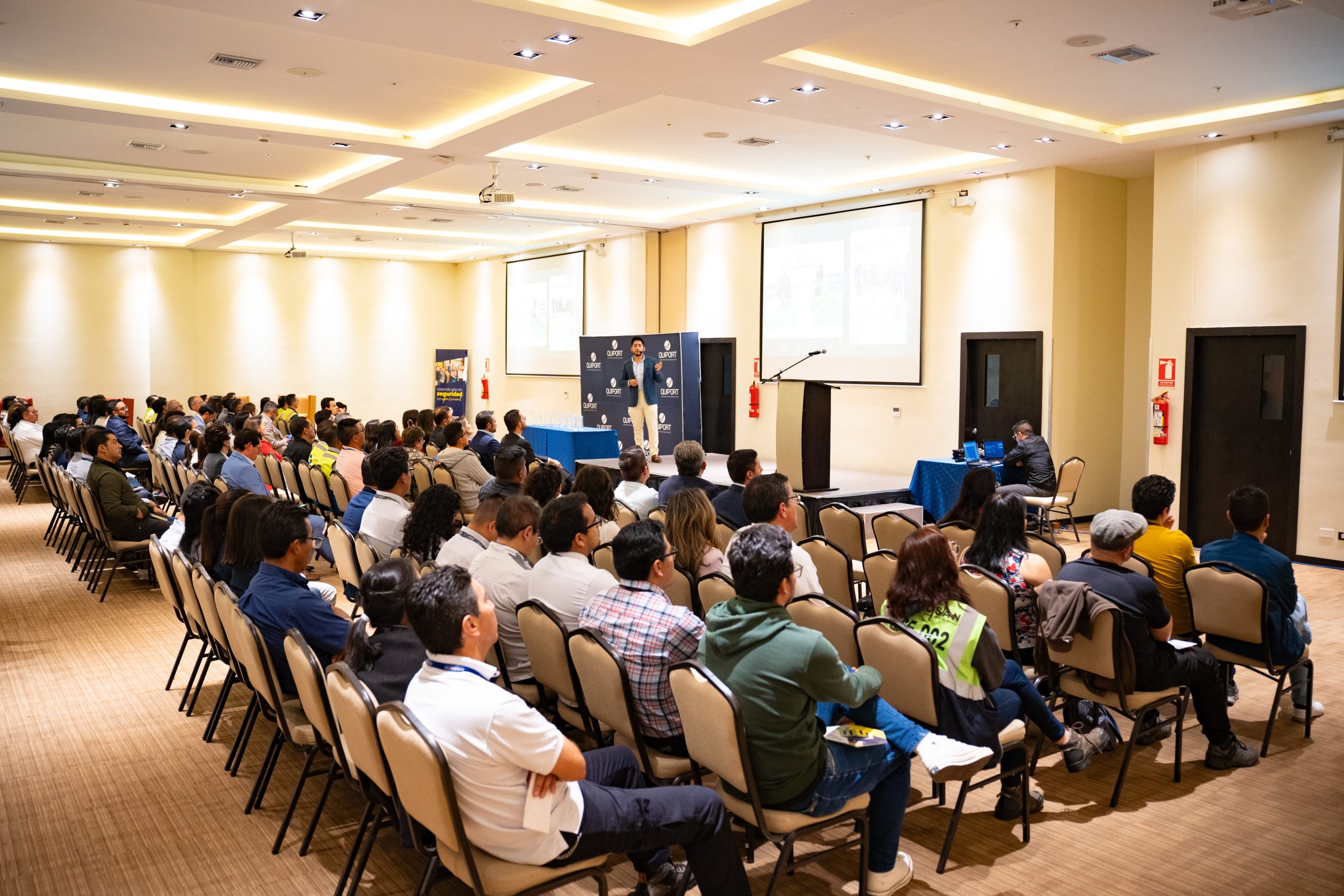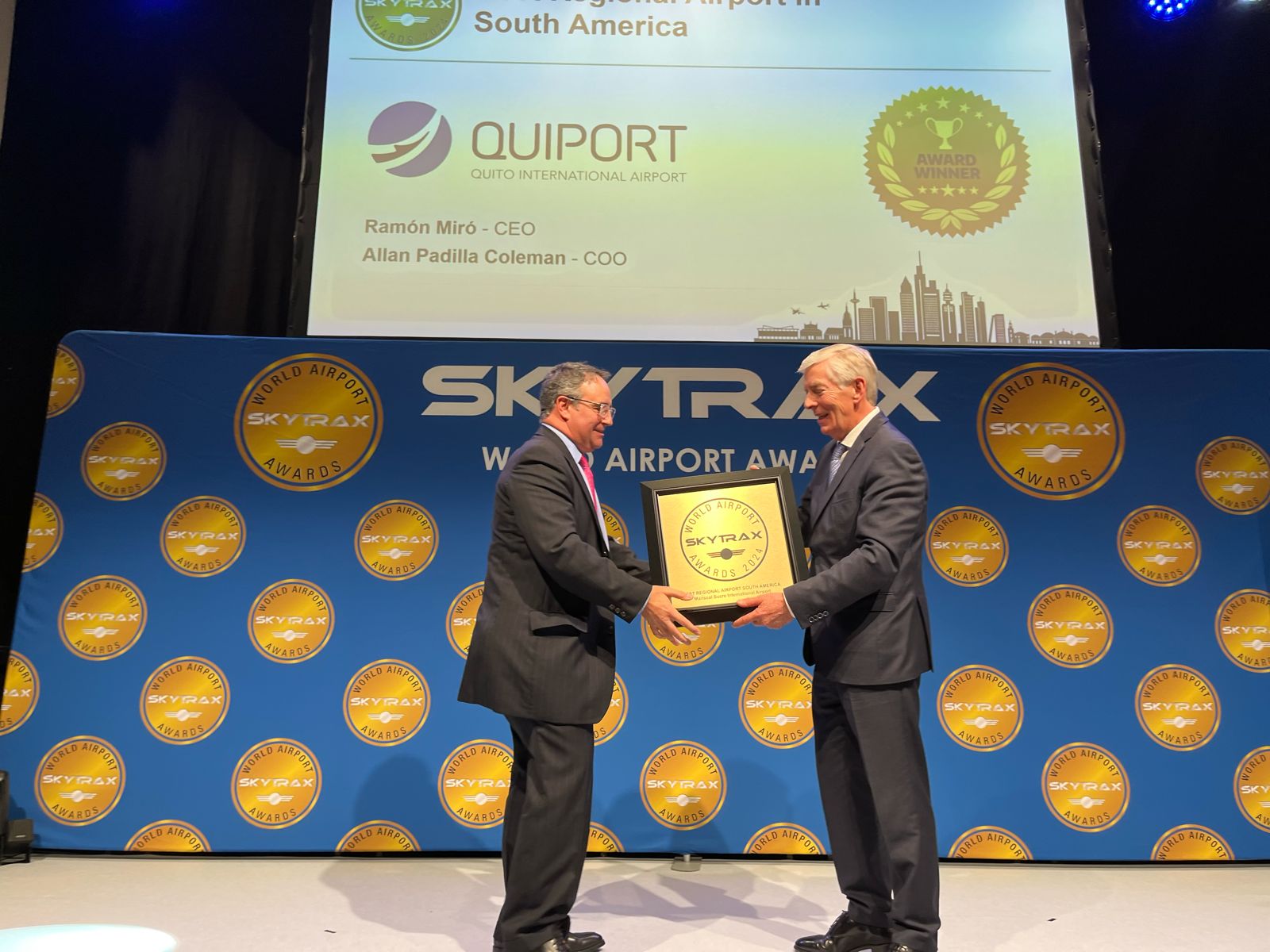Month: April 2024
Quiport inaugurates the first occupational safety and health day for its suppliers and companies at the Quito airport

On Friday, April 26, at the Wyndham Hotel, Quiport organized a pioneering event in occupational health and safety aimed at its suppliers and the business community at the Mariscal Sucre International Airport in Quito. The fundamental purpose was to strengthen and promote the importance of safety and health, as well as recognize the outstanding performance of the participants.
Attendees had the opportunity to participate in a keynote lecture by Ismael Echeverría Fernández, leader in Successful Management of the national consulting firm SSO Ecuador.
In addition to attending the event, the OSH company installed several stands to, through a series of games and participatory activities, raise awareness and guide attendees about the importance of safety and health at work.
The event concluded with the presentation of recognition to companies or individuals that stood out in the implementation of occupational health and safety protocols during the years 2022 and 2023. Among the winners were Allied, ENAE, Mera Mex Air, Avianca and Renato Valverde, recognized for their outstanding comprehensive management in occupational health and safety. On the other hand, Talma, EMSA, Urbapark and SFM were distinguished for their performance in categories such as industrial safety, occupational health, labor compliance or continuous improvement.
Ramón Miró, president and CEO of Quiport, highlighted the importance of the event and congratulated all the winners, underlining the Quiport’s continued commitment to the safety and well-being of the collaborators of our commercial operators, contractors and suppliers.
Given the positive response and interest from attendees, Quiport committed to organizing the event annually to continue promoting this crucial topic and foster a collective culture committed to safety and health at work.
Quiport and FONAG, join together in the conservation and protection of water sources

Replenishing water consumption through economic investment in actions that recover and maintain Quito’s water source ecosystems is a commitment celebrated today between Corporación Quiport and the Fund for the Protection of Water, FONAG.
This is the signing of an agreement that allows the execution of the Water Footprint Replacement project, in which Quiport allocates economic resources (USD 42 thousand) that complement the FONAG investment for the execution of conservation actions for water sources in the short and medium term in the wastelands water sources that supply the Quito airport.
What is the water footprint and why do we replace it?
The water footprint is a metric that indicates our direct or indirect consumption of fresh water. In the case of companies, it is used to measure the total volume of water they use in the production of goods or services.
In a first phase, companies must quantify and reduce their water consumption and in a second phase, replenish the remaining water footprint, through activities and projects according to the state of the water source ecosystems from which companies source their supplies.
How will we do it?
The agreement stipulates several actions that will result in the replacement of Quiport’sannual water footprint. In this sense, we highlight the following:
• Reduction of pressures on water source ecosystems: animal load, fires, waste pollution, among others.
• Environmental awareness.
• Involvement and articulation of different actors in conservation and maintenance activities of water source ecosystems.
• Execution of collective activities by Quiport staff such as cleaning and planting for the production of native plants.
• Provision of equipment for control and surveillance personnel.
Ramón Miró, president and CEO of Corporación Quiport, stated: “We are aware of the responsibility that private companies have to protect the ecosystems that are a source of water, in our particular case, the Andean moors located northeast of the city of Quito. The work carried out by FONAG in this area is key to ensuring the provision of water for large areas of the north of the Metropolitan District of Quito and we are pleased to fulfill our commitment by replacing the water footprint of Quiport and the Mariscal Sucre International Airport ”.
For his part, the technical secretary of FONAG, Bert de Bièvre, considers that strategic alliances with companies that supply Quito´s water source ecosystems are vital for their conservation. “All water users have co-responsibility in caring for the sources. Today Quiport joins this effort in a pioneering way, and thus – once again – we put into practice FONAG’s slogan: Together we take care of water sources!
Mariscal Sucre International Airport in Quito Chosen as Best Regional Airport in South America by Skytrax

- This marks the ninth occasion the Quito International Airport has received this recognition.
- Skytrax World Airport Awards are based on a methodology combining direct passenger feedback with an analysis of various aspects of the airport experience.
- The complete list of winners is published at https://www.worldairportawards.com/award-winners-for-2024/
Mariscal Sucre International Airport in Quito is proud to announce that it has been awarded for the ninth time the title of Best Regional Airport in South America at the Skytrax World Airport Awards, an accolade that highlights excellence in the global airport industry. The Quito airport was also selected as the cleanest in South America.
Skytrax World Airport Awards are regarded as the most prestigious awards in the airport industry; the program recognizes excellence in various aspects of airport management, from facility comfort to quality customer service.
In the global list of the top 100 airports in the world, Quito airport ranks 41st and, along with El Dorado in Bogotá -ranked 39th- are the only two from South America, Central America, and the Caribbean in the top 100.
This recognition is the result of the hard work and commitment of everyone at Mariscal Sucre International Airport, under the leadership of Quiport Corporation, as well as the collaboration with our partner airlines and local and national authorities. Since its inauguration in 2013, Mariscal Sucre Airport has stood out for its modern infrastructure, operational efficiency, and world-class customer service.
Skytrax World Airport Awards are based on a comprehensive methodology that combines direct passenger feedback through an online survey with a detailed
analysis of multiple aspects of the airport experience. This allows for the identification and recognition of airports that excel in service quality and infrastructure in the global airport industry.
“We are delighted and honored to receive this prestigious recognition that validates our continued commitment to excellence and customer satisfaction,” said Ramón Miró, President and CEO of Quiport. “This award is a testament to the work and dedication of the entire Mariscal Sucre Airport family, which constantly strives to provide an exceptional experience to all our passengers.”
Quiport will continue to work tirelessly to maintain the highest standards of quality and service and will remain a benchmark in the regional and global airport industry.
Quito airport obtains Level 4+ ‘Transition’ in the Airport Carbon Accreditation program

• The Mariscal Sucre airport is the first in Latin America and the Caribbean to obtain this level of certification.
• Level 4+ Transition means that Corporación Quiport complies with the compensation of residual carbon emissions while implementing the route towards the decarbonization of airport operations in Quito.
Mariscal Sucre International Airport of Quito has reached a historic milestone by becoming the first airport in Latin America and the Caribbean to receive Level 4+ ‘Transition’ certification in the Carbon Footprint Accreditation Program for Airports, promoted by the Airports Council International (ACI). Thanks to the initiative of Corporación Quiport, the Mariscal Sucre International Airport has been part of this program since 2015.

The Airport Carbon Footprint Accreditation Program (ACA) is an initiative led by ACI that aims to help airports around the world manage and reduce their environmental impact, especially in terms of carbon emissions. This program is based on the evaluation and certification of the actions implemented by airports to reduce their carbon footprint, with different levels of certification that reflect progress and commitment in the matter.
The different levels of certification in the ACA program are as follows:
• Level 1 Mapping: At this level, airports carry out an inventory of their carbon emissions, identifying the main sources of emissions.
• Level 2 Reduction: Airports at this level develop and implement an action plan to reduce their carbon emissions, focusing on concrete measures to improve energy efficiency and reduce fossil fuel consumption.
• Level 3 Optimization: At this level, airports continue to reduce their carbon emissions and work collaboratively with other stakeholders, such as airlines, suppliers and local communities, to promote sustainable practices throughout the supply chain.
• Level 3+ Neutrality: Airports that achieve this level demonstrate that they have fully offset their remaining carbon emissions by purchasing carbon credits or investing in carbon offset projects.
• Level 4 Transformation: Airports at this level have not only achieved carbon neutrality, but have also implemented innovative and strategic measures to further reduce their carbon footprint and promote long-term sustainable practices.
• Level 4+ Transition: airports achieve this level by offsetting residual emissions with reliable counterparts.
• Level 5: This is the highest level of certification in the ACA program. Airports maintain a net zero balance on Scope 1 and 2 emissions and actively address Scope 3 emissions, strengthen the third-party engagement approach and offset residual emissions.
This is the path towards neutrality and decarbonization of operations undertaken by Quiport and Quito airport: level 1 Mapping was obtained in 2015, level 2 Reduction was obtained in 2017, level 3 Optimization in 2018, level 3+ Neutrality in 2019, certification that was renewed in 2021 and 2022. In 2023 Quiport applied to the airport directly to level 4+ Transition, after having completed the activities for level 4 Transformation – which consist of tracing the route towards the decarbonization of its operations by 2035 – and compensate residual emissions through carbon credits from certified projects, a requirement for level 4+ Transition.
These actions reflect the commitment of Quiport and the Quito airport to environmental sustainability and their leadership in the implementation of measures to reduce carbon emissions and promote more eco-efficient air transport.
This distinction positions Mariscal Sucre Airport as an international benchmark in the fight against climate change and sets a high standard for other airports in Latin America and the Caribbean.
Corporación Quiport and the entire airport community are proud of this achievement and reaffirm their commitment to continue working towards a more sustainable and resilient future for future generations.
